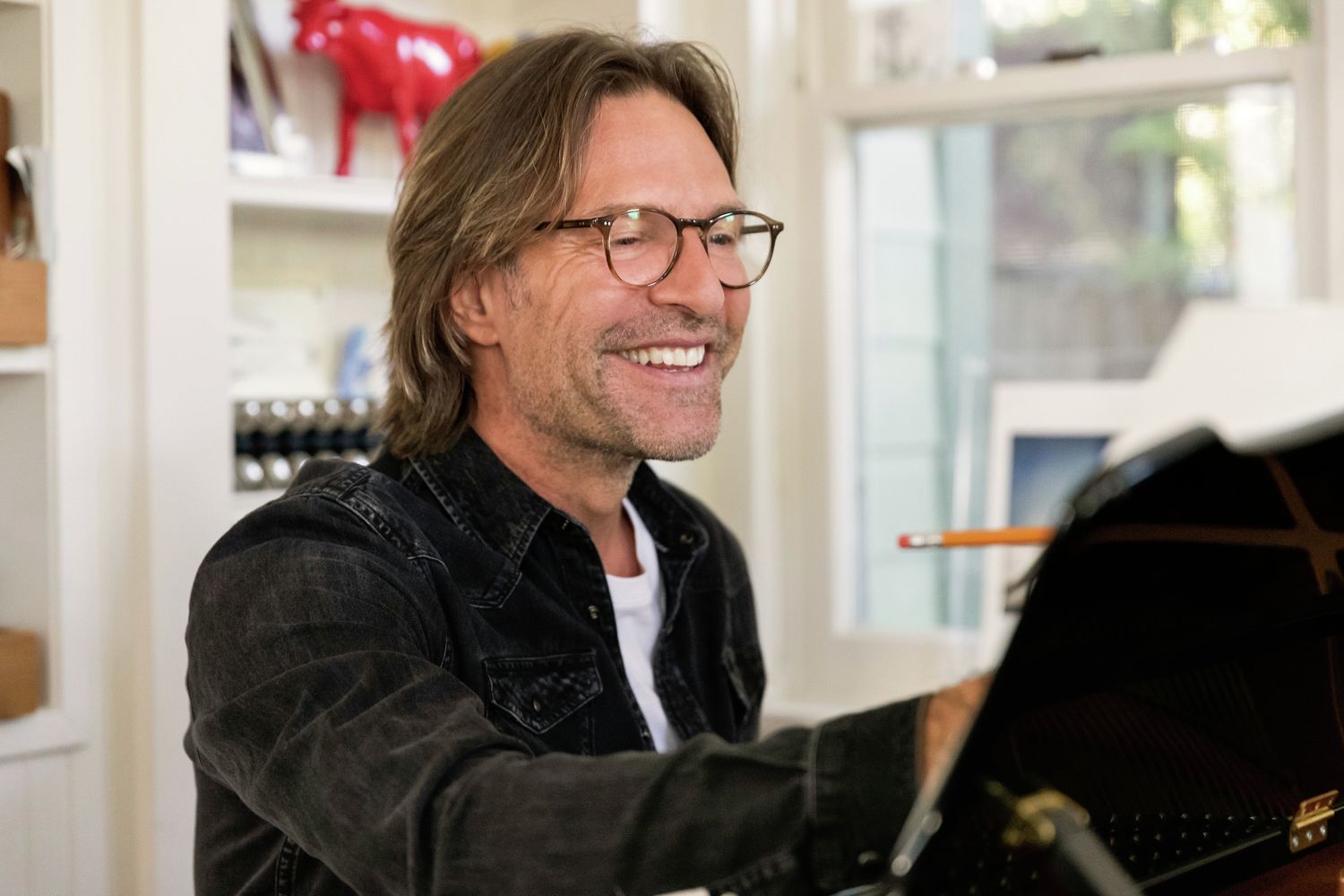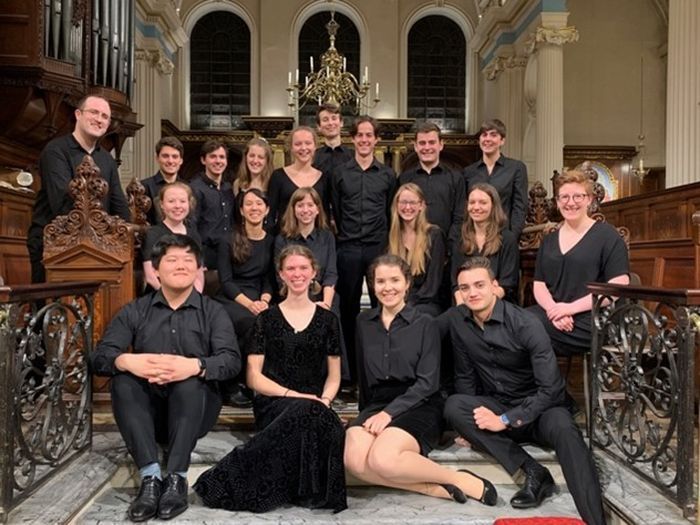Eric Whitacre is one of the most popular choral composers and conductors of modern times. In 2012 he won a Grammy for his album Light and Gold, and he has filled venues from Carnegie Hall to the Royal Albert Hall. His Virtual Choir projects have paved the way for online group singing, particularly relevant during the current pandemic. He is also no stranger to Cambridge: he was a Visiting Fellow at Sidney Sussex in 2010, before being Composer-In-Residence at the college until 2015. He has just completed a five-year residency with the Los Angeles Master Chorale and currently resides in LA. As physically meeting up was impossible for multiple obvious reasons, we resorted to that ubiquitous mode of communication these days, that is the Zoom call.
I start the discussion with his time in Cambridge. “It was beyond idyllic,” he reminisces. “Especially Michaelmas term, and into the winter break, I find it magical there.” During his time here, Whitacre not only composed for the college, but also gave masterclasses and supervisions, as well as attending various lectures (including one in the Physics department!). Asked if there was anything he would have changed, he does have one small thing: “I wish I would have had more formal teaching opportunities. If I were to do it again, I would set something up like conducting or composition or performance.”
“[Cambridge] was beyond idyllic. Especially Michaelmas term, and into the winter break, I find it magical there.”
Whitacre’s music is frequently secular, yet simultaneously sacred. While he rarely sets explicitly Christian texts, a deep sense of spirituality pervades his choral writing, and so I was curious how he thought his music stood on the sacred/secular divide. He defines himself primarily as a Humanist: “At the end of the day, I’m not Christian,” he says, “and I know from experience, having really had some disasters trying to compose, that I have to believe deeply in the text… Christian liturgical texts usually just don’t go to the core of me.” Nevertheless, he is enchanted by the religious experience (one particular example he mentions is Sidney’s Wednesday mass service, which is sung entirely in Latin). He uses the phrase “music that induces a sense of twilight” to describe this sensation: “I think then I end up using a lot of that in my ‘sacred’ works, which are as spiritual as an overtly religious piece.”
There is also a striking difference between his choral works and his band pieces, like Godzilla Eats Las Vegas. “Sometimes I think that I’m a film composer without films,” he explains. “If I write a piece like Godzilla Eats Las Vegas, the question is what sort of toybox do you need to make that world come to life... For a piece like that, only band instruments will make that work.” Even when arranging his choral Lux Aurumque for band, he found it necessary to adapt passages to suit the differing forces. He even liked the changes in the band version so much that he arranged it back for choir under the title Lux Nova. With hindsight, however, he has cooled to this new choir version: “It doesn’t work well [for choir], I don’t think. Now that I’ve conducted it a couple of times, I think I prefer the original version for choir.”
Another boundary his music straddles is that between classical and popular music. I ask about where he feels his music falls in that regard. He relates: “I came to classical music really late, when I was like 19 or 20, and so I never had the sense that classical music was better than other music. It was just another genre. For me it was always ‘I loved this piece by Bach’, but then ‘I also adore this piece by Depeche Mode’… When I’m writing music, it’s not that I’m trying to think ‘I’m going to make it popular/not popular’ etc, mostly it’s just ‘does it work?’. For me that means ‘does it hit me in the gut?’ and if it does, then in a way the style is secondary.” I also address the common divide between ‘serious’ and ‘popular’ music, a distinction Whitacre dislikes. “I hate that moniker of ‘serious’ music,” he says. “I don’t find a lot of classical music to be ‘serious’; it also can be exhilarating.”
“When I’m writing music, it’s not that I’m trying to think ‘I’m going to make it popular/not popular’ etc, mostly it’s just ‘does it work?’”
He is keen to bring the film and video game music he adores into the concert hall. “Film music these days, and especially video game music, is sophisticated and ground-breaking. For me it’s a great way for orchestras and choirs to just pull someone in.” He does admit that the practical augmentation of it would be difficult, even with historic pieces such as Stravinsky’s ballet The Rite of Spring showing that stage works can directly transfer to the concert hall. “Back then [for The Rite of Spring], making a ballet would be like ‘Okay, let’s write a film score’ and then build a film around it. The music works totally on its own. A lot of times in the concert hall, I hear that film music can’t really do that. Maybe if you turn it into a suite then it has some coherence, but mostly it’s these undeveloped ideas.” He is passionate about commissioning film and video game composers, such as “rock-star composer” Thomas Newman, to write ‘concert’ pieces. Nevertheless, he has also seen effective examples of more straight-forward concert hall adaptions: “I went to Video Games Live in the Hollywood Bowl and it was like a rock concert. It was insane. People have such a connection to that music, why wouldn’t you be using that to bring people to the concert hall.”
Even for more traditional classical concerts, Whitacre thinks improvements could be made: “The other thing that I think is sorely missing in most concert music is simple technology, starting with lighting. The idea with a symphony orchestra is that you turn up the lights and just listen. It’s such a visual society now, the very least you could do is just some basic lighting. It would transform the stage.” He also believes that contemporary classical music could do more to engage the audience. “It seems to me that a lot of contemporary classical music doesn’t wait for the audience,” he says. “Some of it feels like it’s been written for other composers. I think people would really love to be swept away but they just need to be ‘educated’ in real time. You can’t go get a Masters degree in music and then appreciate the piece.” He cites The Rite of Spring as a paragon of this style of ‘education’: “Without realising what he has done, you’ve not only been seduced by Stravinsky, but you’ve been taught the harmonic/rhythmic language... The education needs to be built into the piece; when that happens, I think people will go on long, really strange journeys.”
Finally, there are two pieces of advice he would offer to aspiring composers and conductors. The first is about what he calls ‘proximity’: “If you’re a film composer, you’ve got to move to Los Angeles and ideally you’ve got to be making coffee for Hans Zimmer. You’ve just got to get next to the fire, not only because you’re going to learn how this whole crazy machine works, but because that’s where the opportunities happen.” The other is to be authentic: “You’ll sometimes see videos that go viral, and it’s just because they’re real. It’s a genuine human moment and people are entranced by it. In my experience, there’s a certain kind of piece that knocks people out because it dazzles. That lasts a little bit, that’s like a firework. If it’s authentic, if it goes straight to the bone, if it’s a human truth: even if it’s just simple, that’s the stuff that sustains, the stuff people start sharing with other people.”
“You’ve just got to get next to the fire, not only because you’re going to learn how this whole crazy machine works, but because that’s where the opportunities happen.”
His comments incidentally reflect on the development of social media, with Vine and TikTok growing and competing with the increasingly manufactured nature of sites like Youtube by focussing on ‘authenticity’ and ‘real’ people. This idea resonates with Whitacre strongly. “In my little corner of the world, I’m always amazed and heartened by the idea of the simplest gesture,” he says. “A delicate phrase of poetry, sung beautifully, cuts through everything. It goes straight to the core.” For many listeners, this sums up his music perfectly. In the noise and humdrum of contemporary society, beauty can be hard to come by. However, through music, it is possible to change lives. Whitacre himself was transformed by a performance of Mozart’s Requiem; his music, through its beauty and authenticity, enriches the world, one note at a time.


